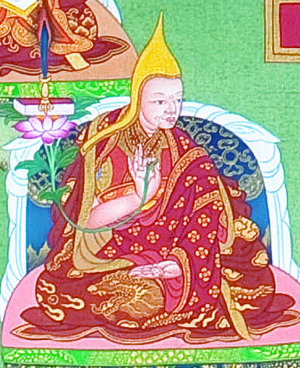Changkya Rolpé Dorje: Difference between revisions
m (→External Links) |
|||
| Line 10: | Line 10: | ||
==Writings== | ==Writings== | ||
His seven volumes of writings<ref>W28833. An eight-volume edition was also published in the Dharamsala (TBRC: W29035)</ref> include a classic work on philosophical tenets,<ref>''grub mtha’ thub bstan lhun po’i mdzes rgyan''. Due to be translated and published by the Library of Tibetan Classics.</ref> the famous ''A Song on the View'' to which [[Mipham Rinpoche]] composed a commentary<ref>See Karl Brunnhölzl, ''Straight from the Heart: Buddhist Pith Instructions'', Snow Lion, 2007, pp. 391-427 for a translation of the root text and Mipham Rinpoche's commentary</ref>, and a guide to [[Wutai Shan]]. | His seven volumes of writings<ref>W28833. An eight-volume edition was also published in the Dharamsala (TBRC: W29035)</ref> include a classic work on philosophical tenets,<ref>''grub mtha’ thub bstan lhun po’i mdzes rgyan''. Due to be translated and published by the Library of Tibetan Classics.</ref> the famous ''A Song on the View'' to which [[Mipham Rinpoche]] composed a commentary<ref>See Karl Brunnhölzl, ''Straight from the Heart: Buddhist Pith Instructions'', Snow Lion, 2007, pp. 391-427 for a translation of the root text and Mipham Rinpoche's commentary</ref>, and a guide to [[Wutai Shan]]<ref>''Pilgrimage Guide to the Pure Realm of Clear and Cool Mountain'' (Wyl. ''zhing mchog ri bo dwangs bsil gyi gnas bshad'')</ref>. | ||
==Notes== | ==Notes== | ||
Revision as of 16:45, 24 October 2016

Changkya Rolpé Dorje (Wyl. lcang skya rol pa'i rdo rje) (1717-1786) was an important Gelugpa scholar from Amdo, who oversaw the translation of the Tibetan Buddhist canon into Mongolian and Manchurian.
Biography
Born into an ethnically Mongolian family in the Tsongkha region of Amdo in 1717, Changkya Rolpé Dorje was recognized at the age of four as the reincarnation of Changkya Lobzang Chöden. Following disturbances in Amdo and the destruction of his home monastery of Gönlung, he was taken to the imperial court in Beijing where he received a thorough education from a number of masters. He travelled to Lhasa, accompanying and receiving teachings from, the Seventh Dalai Lama, Kalzang Gyatso, in 1734, and the following year, in 1735, he was fully ordained at Tashilhunpo Monastery and received the name Yeshe Tenpé Drönmé from the Panchen Lama, Lobzang Yeshe. Following the sudden death of the emperor, Yung-cheng, he returned to the imperial court in Beijing.
At the request of the new emperor, Ch'ien-lung, he oversaw a project to translate the Tengyur into Mongolian. The basis was a glossary Changkya had compiled called The Source of Learning (dag yig mkhas pa'i 'byung gnas). In 1757, Changkya travelled to Lhasa again, where he played a key role in identifying the Eighth Dalai Lama and wrote the Seventh Dalai Lama's biography.
He died in 1786 at his retreat at Wu Tai Shan.
Writings
His seven volumes of writings[1] include a classic work on philosophical tenets,[2] the famous A Song on the View to which Mipham Rinpoche composed a commentary[3], and a guide to Wutai Shan[4].
Notes
- ↑ W28833. An eight-volume edition was also published in the Dharamsala (TBRC: W29035)
- ↑ grub mtha’ thub bstan lhun po’i mdzes rgyan. Due to be translated and published by the Library of Tibetan Classics.
- ↑ See Karl Brunnhölzl, Straight from the Heart: Buddhist Pith Instructions, Snow Lion, 2007, pp. 391-427 for a translation of the root text and Mipham Rinpoche's commentary
- ↑ Pilgrimage Guide to the Pure Realm of Clear and Cool Mountain (Wyl. zhing mchog ri bo dwangs bsil gyi gnas bshad)
Further Reading
- E. Gene Smith, 'The Life of Lcang skya Rol pa'i rdo rje' in Among Tibetan Texts, Boston: Wisdom Publications, 2001
- Illich, Marina, Selections from the life of a Tibetan Buddhist polymath: Chankya Rolpai Dorje (lcang skya rol pa'i rdo rje), 1717-1786. Ph.D. dissertation, Columbia University, 2006.
- Wang Xiangyun. “The Qing Court's Tibet Connection: Lcang skya Rolpa'i rdo rje and the Qianlong Emperor.” In HJAS vol. 60 no. 1. June, 2000.